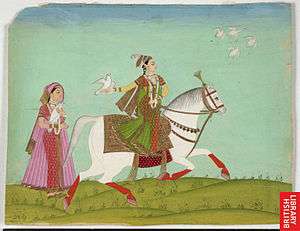Deccani Muslims
The Deccani People or Deccani Muslims are a community of Urdu-speaking Muslims who inhabit the Deccan region of Southern India, and speak Deccani, a variety of Urdu.[3] The community traces its origins to the shifting of the Delhi Sultanate's capital from Delhi to Daulatabad in 1327 during the reign of Muhammad bin Tughluq, and come from various native and foreign ethnic backgrounds [4] The migration of Urdu speaking peoples to the Deccan led to the creation of a new variety of Urdu called Deccani, as well as the establishment of the Bahmani Sultanate, which was the first Independent Muslim kingdom in southern India,[5] and the Deccan Sultanates which followed its demise.[6] Deccani Muslims can have Arab, Afghan, Persian, and Turkic ancestries in addition to having the local Dravidian and Indo Aryan heritage.[7] Deccani Muslims, are found in many places throughout South India, extending from southern Maharashtra, to northern Tamil Nadu including Karnataka, Telangana, Andhra Pradesh, and Kerala where Deccani Muslims from the north migrated, and formed a community there.[8] There are also large diaspora communities, especially in Pakistan, where they settled after Indian independence, forming a portion of the Urdu speaking minority of Pakistan, the Muhajirs.[9]
Urdu: دکنی مسلمان, romanized: (Dakani Musalmān) | |
|---|---|
| Total population | |
| 23,000,000 [1][2] | |
| Regions with significant populations | |
| Languages | |
| Urdu in the forms of Hyderabadi Urdu and the Dakhini sub-dialect as well as standard Urdu• Hindi • Telugu • Marathi• Tamil• Sindhi • English • The vernacular languages of other countries in the diaspora | |
| Religion | |
| •Islam • Minority Shia and Isma'ilism | |
| Related ethnic groups | |
| • Tamil Muslims • Andhra Muslims • Marathi Muslims • Hyderabadi Muslims • Muhajir people • Other Indian Muslim communities |
The Deccani People are further divided into Hyderabadis (from Hyderabad Deccan), Mysoris (from Mysore state), and Madrasis (from Madras state).
History
The word Deccani (Persian: دکنی from Prakrit dakkhin "south") was derived in the court of Bahmani rulers in 1487 AD during Sultan Mahmood Shah Bahmani II.[10]
References
- http://www.censusindia.gov.in/2011census/c-01.html
- Fatihi, A.R. "Urdu in Andhra Pradesh". Language in India. Archived from the original on 13 July 2015. Retrieved 22 July 2015. Cite journal requires
|journal=(help) - "Kya ba so ba – Learning to speak south-indian urdu". www.zanyoutbursts.com. Retrieved 18 March 2016.
- Aggarwal, Dr Malti Malik and Mala. Social Science. New Saraswati House India Pvt Ltd. ISBN 978-93-5199-083-3.
- "Bahmani sultanate | historical Muslim state, India". Encyclopædia Britannica. Retrieved 18 March 2016.
- "Sultans of Deccan India, 1500-1700 Opulence and Fantasy | The Metropolitan Museum of Art". metmuseum.org. Retrieved 18 March 2016.
- Eaton, Richard Maxwell (1996). Sufis of Bijapur, 1300 - 1700 : social roles of Sufis in medieval India (2nd ed.). New Delhi: Munshiram Manoharlal Publ. p. 41. ISBN 978-8121507400. Retrieved 11 May 2016.
- Mohammada, Malika (1 January 2005). Culture of Hindi. Kalinga Publications. ISBN 9788187644736.
- Leonard, Karen Isaksen (1 January 2007). Locating Home: India's Hyderabadis Abroad. Stanford University Press. ISBN 9780804754422.
- Narendra Luther (1991). Prince;Poet;Lover;Builder: Mohd. Quli Qutb Shah - The founder of Hyderabad. Publications Division Ministry of Information & Broadcasting. ISBN 9788123023151. Retrieved 13 January 2020.
